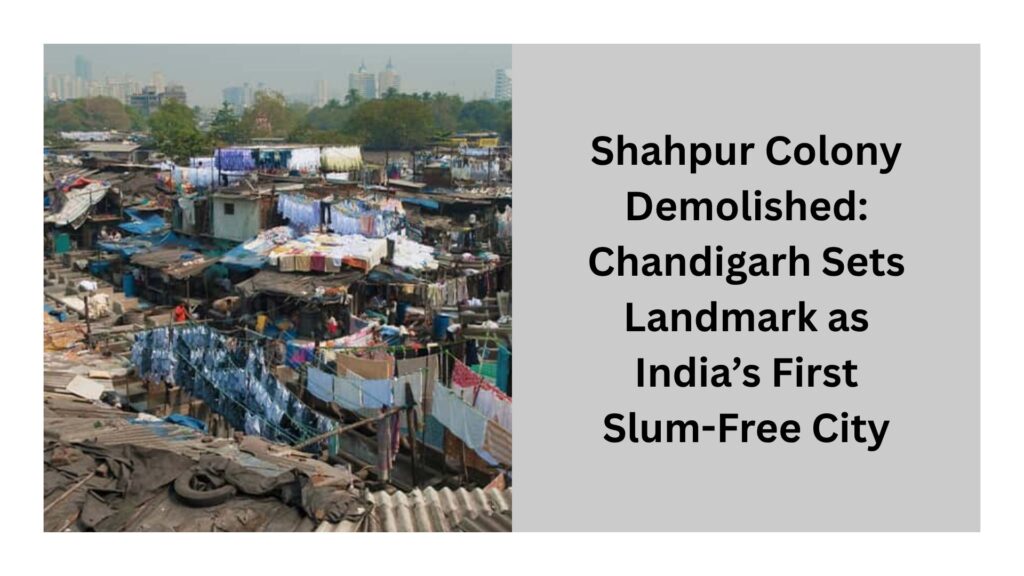Chandigarh Declared India’s First Slum-Free City After Demolition of Shahpur Colony

Chandigarh has etched its name in history as the first Indian city to be officially declared slum-free, following the demolition of Shahpur Colony — the last informal settlement within its limits.
On Tuesday, the city administration confirmed that the decades-long vision to eliminate slums had finally been achieved. The announcement marks the end of a sustained 12-year campaign that has not only cleared overcrowded colonies but also reclaimed more than 520 acres of valuable public land, paving the way for modern development projects, new housing, and the revival of open spaces.
Shahpur Colony Raze: The Final Step
The demolition of Shahpur Colony brought down the curtain on Chandigarh’s chapter of slum settlements. According to officials, the drive helped recover another five acres of land, a move seen as both symbolic and strategic. Chandigarh Deputy Commissioner Nishant Kumar Yadav described it as a turning point for the city.
“The demolition of Shahpur Colony marks a significant milestone for Chandigarh,” Yadav told The Indian Express, underlining the importance of this long-drawn effort to improve living conditions and urban management.
Police teams were deployed early on Monday to ensure a safe and smooth operation. Residents had been vacated in advance, with local authorities emphasizing that safety and order remained top priorities throughout the process.
A Campaign That Spanned Over a Decade
Chandigarh’s mission to become slum-free was not an overnight success. It began more than ten years ago with determined efforts to address the rapid growth of informal settlements. Many of these slums had mushroomed on prime public land, often lacking basic amenities and putting pressure on civic infrastructure.
One of the biggest breakthroughs came in 2014, when Kalyan Colony, a sprawling settlement, was cleared and nearly 89 acres of land were reclaimed. In the same year, Ambedkar Colony was also razed, releasing another 65 acres back to the public. More recently, in 2022, Colony No. 4 was demolished, recovering an additional 65 acres. Other settlements, such as Adarsh Colony, Sanjay Colony in the Industrial Area, and the Sector 25 slum cluster, were also cleared in successive phases.
This sustained campaign reflects how Chandigarh approached slum rehabilitation systematically, tackling one settlement at a time until the last encroachment was removed.
Economic and Developmental Impact
According to officials, land worth more than ₹2,500 crore has been reclaimed during just this year’s demolition drives. These reclaimed lands are now expected to be used for urban renewal projects, public infrastructure, housing schemes, and recreational spaces, giving Chandigarh a chance to balance its rapid modernization with sustainable growth.
Urban planners believe that Chandigarh’s success story could serve as a model for other cities across India, many of which continue to grapple with unplanned settlements and rising land pressures.
Balancing Development and Human Concerns
While the achievement is being celebrated as a major milestone, the process has not been without challenges. Eviction drives always come with social and emotional costs for families displaced from their long-standing homes. Officials have stated that relocation and rehabilitation policies were put in place to support affected residents, though the effectiveness of such measures will continue to be monitored.
Nonetheless, city leaders argue that the larger vision of a slum-free Chandigarh will translate into better living standards, improved sanitation, more efficient land use, and restored public spaces for the city’s 1.1 million residents.
A Historic First for India
Chandigarh’s journey from being home to large informal colonies to becoming India’s first officially slum-free city is being hailed as a transformative achievement. For a city often recognized as one of the best-planned in the country, this milestone further strengthens its identity as a benchmark for urban governance and civic management.
As bulldozers rolled into Shahpur Colony to clear the last remaining structures, it wasn’t just about reclaiming land — it was about closing an era of unplanned settlements and opening doors to a new phase of organized, inclusive growth.